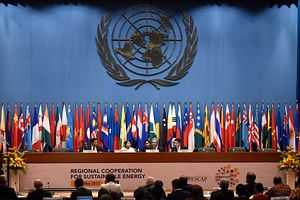Once again, China has blocked the designation of Jaish-e-Mohammed founder Masood Azhar as a “global terrorist” by the United Nations Security Council. India had pushed for Azhar to be included on the list of sanctioned individuals under Security Council resolution 1267, a motion backed by UNSC permanent members the United States, the United Kingdom, and France. JeM claimed responsibility for the deadly terrorist attack on Indian security forces in Pulwama, Indian-administered Kashmir, on February 14.
India has tried to have Azhar listed before, most notably in 2016. Then, as now, the proposal was motivated by a terrorist attack – at that time, in response to the attack on an Indian Air Force base at Pathankot. China placed a technical hold on the request in 2016, and has now done so again, despite a heavy emphasis on having Azhar given the global terrorist designation by New Delhi. In all, this marked the fourth time China has used its permanent member status on the UNSC to place a hold on sanctioning Masood Azhar.
The move was not a surprise. As of Monday, there was little indication that China’s position had changed. Foreign Ministry spokesperson Lu Kang, when asked about the potential listing of Azhar, repeated the official line that “China has all along participated in relevant discussions in a responsible manner and in strict accordance with the rules of procedure and provisions of the 1267 Committee.”
That was a oblique reference to China’s rationale for placing a hold on Azhar’s designation in the past. Beijing typically claims that the proposal does not meet the technical requirements of the committee rather than outright insisting that Azhar is not a terrorist.
“China will continue to communicate and work with relevant parties in a responsible manner so as to properly resolve this matter,” Lu continued. “Only by making a decision through responsible and serious discussions can we find a lasting solution.”
For China, the most “relevant party” is of course Pakistan, “all-weather friend” and “iron brother” to Beijing. Azhar is based in Pakistan and reportedly has ties to Pakistani intelligence. Even if those rumors are unfounded, it would be deeply embarrassing for Azhar, who operates openly and freely in Pakistan, to be denounced at the United Nations as a terrorist. If Azhar were to be sanctioned under resolution 1267, states – including Pakistan — would be required to freeze his assets and prevent his travel. China’s interests in keeping Pakistan happy have if anything grown since Beijing last blocked Azhar’s name from being added to the UNSC list, thanks to the continued expansion of the China-Pakistan Economic Corridor.
Still, there was a sliver of hope this time. For one thing, India has been on a high-profile mission to reset its relationship with China in the past year, following the April 2018 Wuhan summit between Indian Prime Minister Narendra Modi and Chinese President Xi Jinping. Plus, international outrage ran high over the Pulwama attack, meaning there was a window of opportunity to pressure China into allowing the designation. As Tanvi Madan pointed out on Twitter, Beijing had allowed Hafiz Saeed, the Pakistan-based founder of Lashkar-e-Taiba, to be added to the sanctions list in 2008, shortly after the Mumbai attacks.
But apparently in the end the Pulwama attack was not enough to change Beijing’s calculus – or Pakistan’s, despite a near-brush with all-out war that saw India and Pakistan exchange cross-border air strikes. Earlier this month, Pakistani Information Minister Fawad Chaudhry told Al Jazeera that Azhar was not a key figure in JeM, and thus listing him served no purpose. “Masood Azhar is now more of a symbolic thing,” Chaudhry said, describing the JeM founder as “too ill, frail, and old.”
“China believes that only a plan adopted by all can offer a long-term solution,” Lu said when asked again by the Masood Azhar designation on March 13, further signaling that China will only change its position on the issue when Pakistan does.
After China’s rejection, India’s Ministry of External Affairs issued a statement saying, “We are disappointed by this outcome” while also expressing gratitude for “the unprecedented number of … Security Council members as well as non-members” who supported the proposal.
“We will continue to pursue all available avenues to ensure that terrorist leaders who are involved in heinous attacks against our citizens are brought to justice,” the statement concluded.
Interestingly, however, the MEA statement refrained from mentioning China by name, instead saying only that “a member” of the 1267 Sanctions Committee had placed “the proposal on hold.”

































